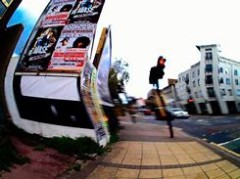Filter by

Surveillance, Privacy and Security : Citizens’ Perspectives
This volume examines the relationship between privacy, surveillance and security, and the alleged privacy–security trade-off, focusing on the citizen’s perspective. Recent revelations of mass surveillance programmes clearly demonstrate the ever-increasing capabilities of surveillance technologies. The lack of serious reactions to these activities shows that the political will to implemen…
- Edition
- -
- ISBN/ISSN
- 9781315619309
- Collation
- -
- Series Title
- -
- Call Number
- -

Worn out :how retailers surveil and exploit workers in the digital age and ho…
"Worn Out connects scholarship on digital capitalism and surveillance to the specific setting of retail work in fast fashion"--OCLC-licensed vendor bibliographic record.
- Edition
- -
- ISBN/ISSN
- 9780262372770
- Collation
- 1 online resource.
- Series Title
- -
- Call Number
- -

Nonhuman Photography
"Today, in the age of CCTV, drones, medical body scans, and satellite images, photography is increasingly decoupled from human agency and human vision. In Nonhuman Photography, Joanna Zylinska offers a new philosophy of photography, going beyond the human-centric view to consider imaging practices from which the human is absent. Zylinska argues further that even those images produced by humans,…
- Edition
- -
- ISBN/ISSN
- 9780262343367
- Collation
- 1 online resource (viii, 257 pages) :illustrations
- Series Title
- -
- Call Number
- -

Privacy on the line :the politics of wiretapping and encryption
Telecommunication has never been perfectly secure. The Cold War culture of recording devices in telephone receivers and bugged embassy offices has been succeeded by a post-9/11 world of NSA wiretaps and demands for data retention. Although the 1990s battle for individual and commercial freedom to use cryptography was won, growth in the use of cryptography has been slow. Meanwhile, regulations r…
- Edition
- Updated and expanded ed.
- ISBN/ISSN
- 9780262256018
- Collation
- 1 online resource (xvii, 473 pages) :illustrations
- Series Title
- -
- Call Number
- -

The sensorium of the drone and communities
"This is a book about how drones sense the world, and the imaginaries of communities they construct"--OCLC-licensed vendor bibliographic record.
- Edition
- -
- ISBN/ISSN
- 9780262374903
- Collation
- 1 online resource
- Series Title
- -
- Call Number
- -

Surveillance or security? :the risks posed by new wiretapping technologies
In this book, the author argues that in embarking on an unprecedented effort to build surveillance capabilities deeply into communications infrastructure, the U.S. government is opting for short-term security and creating dangerous long-term risks. Landau describes what makes communications security hard, warrantless wiretapping and the role of electronic surveillance in the war on terror, the …
- Edition
- -
- ISBN/ISSN
- 9780262295581
- Collation
- 1 online resource (xvi, 383 pages) :illustrations, maps
- Series Title
- -
- Call Number
- -
 Computer Science, Information & General Works
Computer Science, Information & General Works  Philosophy & Psychology
Philosophy & Psychology  Religion
Religion  Social Sciences
Social Sciences  Language
Language  Pure Science
Pure Science  Applied Sciences
Applied Sciences  Art & Recreation
Art & Recreation  Literature
Literature  History & Geography
History & Geography